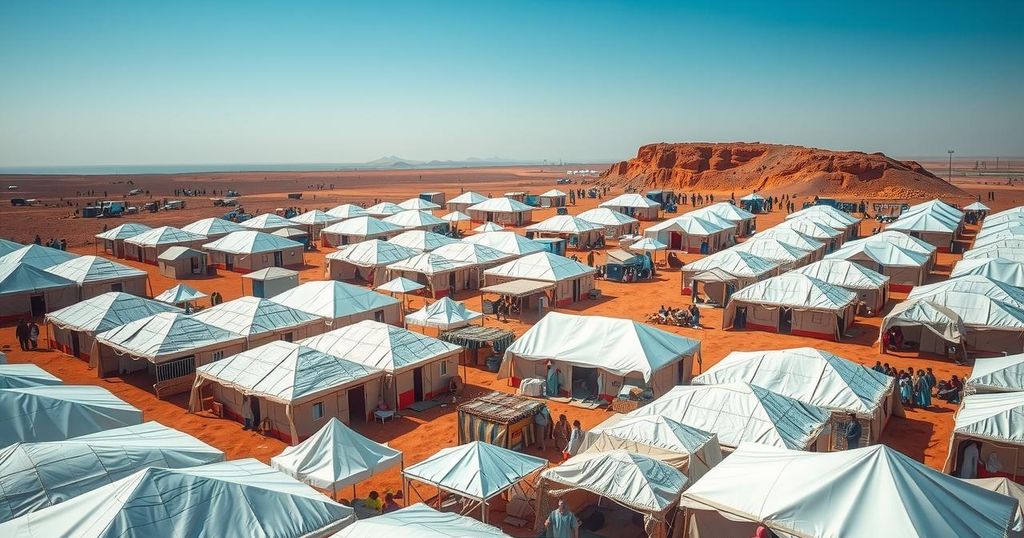The civil war in Sudan has led to an influx of refugees into Chad, straining the resources of Touloum camp. With over 770,000 Sudanese now in Chad, malnutrition and health emergencies are rising sharply. Local officials and humanitarian groups call for urgent aid as conditions worsen amidst impending disease outbreaks.
In the eastern Chad camp of Touloum, the steady influx of refugees fleeing the Sudanese civil war has caused severe strain on the facilities and resources available, intensifying the challenges faced by the Campbell staff. Nadjala Mourraou, a mother who fled the conflict in Nyala, entrusted her two-year-old son, Ahma, to the medical team, only to discover he was severely malnourished. Mourraou lamented, “We’re suffering from a lack of food,” explaining that their daily meals consisted solely of a bowl of assida, a basic porridge made from sorghum.
As the war in Sudan continues, the humanitarian situation remains dire. Over the two years of fighting, a staggering 13 million individuals have been uprooted from their homes. Chad, one of the poorest nations globally, has welcomed over 770,000 refugees, according to the UN refugee agency, but concerns are mounting as more seem likely to arrive.
Conditions in the Touloum camp are alarming as reports of malnutrition rise rapidly. Dessamba Adam Ngarhoudal, a nurse with Doctors Without Borders, indicated that nearly half of the consultations performed daily address malnutrition issues. The most severe cases are referred to a hospital situated about half an hour away, yet recent tragedies, including the first documented death of a Sudanese infant due to malnutrition at the facility, underscore the urgent need for assistance.
Malnutrition rates, bolstered by the prevailing hot season, have strained local healthcare resources. Nurse Hassan Patayamou noted, “Since the beginning of the month we have already exceeded the capacity of the malnutrition ward at the hospital,” showing the crisis is reaching a critical point as temperatures climb over 40 degrees Celsius.
With no clear end to the conflict in sight, Chad’s capacity to support increasing numbers of refugees is in jeopardy. The UN High Commissioner for Refugees has expressed concern that numbers may swell to nearly one million. This increase presents a formidable challenge for Chad, already struggling with a limited budget for refugee support, with only about 14 percent of the required $409 million raised so far.
Govenor Djimbaye Kam-Ndoh of Wadi Fira province acknowledged the Chadian people’s tradition of assisting their Sudanese neighbors but warned of the overwhelming pressures this influx puts on local resources. He remarked, “But the population of the province has practically doubled and we’re asking for major support.”
Concerns have also been raised regarding potential cuts to foreign aid, specifically due to funding adjustments from the United States and Europe. Alexandre Le Cuziat, deputy director of the UN’s World Food Programme in Chad, emphasized, “Hundreds of thousands of lives are at stake.”
As rainy season approaches, healthcare workers fear outbreaks of preventable diseases like malaria and measles may follow. Samuel Sileshi, an emergencies coordinator at MSF, cautioned about the “devastating consequences” that could ensue for already vulnerable populations, particularly children.
The ongoing Sudanese civil war has forced hundreds of thousands of individuals to seek refuge in Chad, leading to an unprecedented strain on resources in camps like Touloum. Malnutrition rates among children are rising sharply, and local healthcare facilities are overwhelmed. As support from international donors dwindles, the situation poses an existential threat to the health and survival of many refugees. Increased aid and urgent intervention become critical as the rainy season looms, potentially exacerbating health crises in the region.
Original Source: www.bssnews.net






